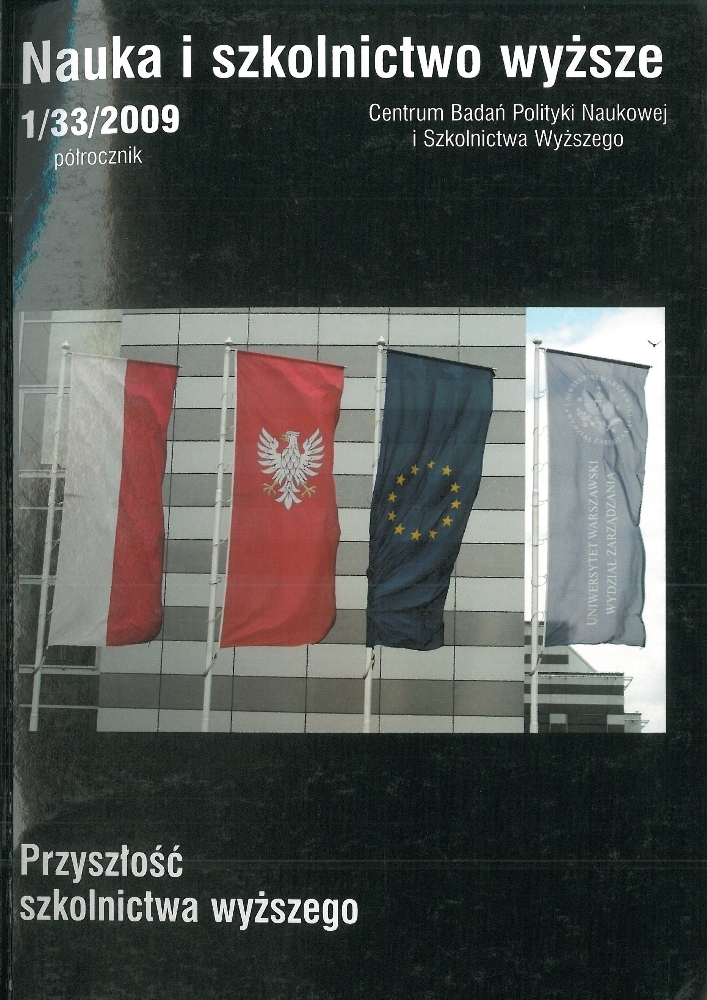Abstract
The paper aims to answer two questions concerning inequalities at the tertiary level of education. Firstly, the impact of social background on the choices of fields studies, and, secondly, the gender-driven selection of fields of study. Research conducted to date has shown a visible relationship between one’s social background and the selection of academic disciplines studied. Individuals who have better-educated parents are more likely to study prestigious fields such as law or medicine. It has also been claimed that women are more likely to choose studies in humanities and social Sciences whereas men favour technical studies. Will these trends continue to exist given the rapid increase in the number of tertiary-level students in Poland sińce 1990s? The results of a survey conducted in three public universities in Białystok in 2008 have shown that students’ choices are driven by both their social background and gender. Also, a relationship has been identified between the choices of fields of study and the overall propensity to take risks. The author interprets the results of the survey building on the theory of cultural Capital, theory of monopolisation and rational choice.
References
Aschaffenburg Karen, Mass Inke 1997 Cultural and Educational Careers: The Dynamics ofSocial Reproduction, „American Sociological Review”, nr 62.
Bernstein Basil 1990 Odtwarzanie kultury, Państwowy Instytut Wydawniczy, Warszawa.
Bratti Massimiliano 2003 Socio-Economic Status and Field of Study at the Undergraduate Level in the UK (www.uib.eslcongresleconschoollpaperslbratti_MED.pdf).
Bothelho Anabela, Costa Pinto Ligia 2004 Studenfs Expectations of the Economic Returns to College Education: Results of a Controlled
Experiment, „Economies of Education Review”.
Breen Richard, Jonsson Jan O. 2007 Explaining Changes in Social Fluidity: Educational Equalization and Educational Expansion in Twentieth-Century Sweden, „American Journal of Sociology” .
Bourdieu Pierre 2004 Męska dominacja, Oficyna Naukowa, Warszawa.
Bourdieu Pierre, Passeron Jean-Claude 2005 Reprodukcja. Elementy teorii systemu nauczania, Wydawnictwo Naukowe PWN, Warszawa.
Boudon Raymond 1974 Education, Opportunity and Social Ineguality, John Wiley, New York.
CBOS 2007 Czy warto się uczyć? Komunikat z badań, Centrum Badania Opinii Społecznej, Warszawa.
Chafetz Janet 1990 Gender Equity. An Integrated Theory of Stabitity and Change, Sage Publication, New York.
Collins Randal 1979 Credential Society, Academic Press, United Kingdom.
Davies Richard, Heinesen Eskil, Holm Anders 2002 The Relative Risk Aversion Hypothesis of Education Choices, „Journal of Population Economics”, nr 15.
Davies Scott, Guppy Neil 1997 Field of Study, College Selectivity, and Student lnequalities in Higher Education, „Social Force”, nr 75.
DiMaggio Paul 1982 Cultural Capital and School Success: The Impact of Status Culture Participation on the Grades of U.S. High School Students, „American Sociological Review” .
Dominitz Jeff, Manski Charles 1994 Eliciting Students Expectations of the Returns to Schooling, „The Journal of Humań Resources”, nr 31.
Domański Henryk 2002 Polska klasa średnia, Fundacja na rzecz Nauki Polskiej, Wrocław.
Dryler Helen 1998 Parental Role Models, Gender and Educational Choice, „British Journal of Sociology” , nr 49.
Gerber Theodore R, Schaefer David R. 2004 Horizontal Stratification of Higher Education in Russia: Trends, Gender Differences, and Labor Market Outcomes, „Sociology of Education” , nr 77.
Goldthorpe John H. 1996 Class Analysis and the Reorientation of Class Theory: The Case of Persisting Differentials in Educational Attainment, „British Journal of Sociology”, nr 46.
Goyette Kimberly, Mullen Ann 2006 Who Studies the Arts and Sciences? Social Background and the Choice and Consequences of Undergraduate Field of Study, „The Journal of Higher Education” , nr 77.
Graff Paul M. de 1986 The Impact of Financial and Cultural Resources on Educational Attainment in the Netherlands, „Sociology of Education”, nr 59.
Hyman Herbert H. 1962 Systemy wartości uznawane przez różne klasy społeczne. Psychologiczny przyczynek do analizy stratyfikacji, w: A. Malewski (red.): Zagadnienia psychologii społecznej, Państwowe Wydawnictwo Naukowe, Warszawa,
lannelli Cristina, Smyth Emer 2000 Unequal Pathways? The Effect of Gender, Social Background and Education on Early Labor Market Transition in Europę, European Network on Transition in Youth Annual Workshop.
Lucas Samuel 2001 Maintained lnequality: Education Transition, Track Mobility, and Social Background Effect, „American Journal of Sociology”, nr 106.
Mare Robert D. 1980 Social Background and School Continuation Decision, „Journal of the American Statistical Association”, nr 75.
Parkin Frank 1974 Strategies of Social Closure in Class Formation, w: F. Parkin (red.): The Social Analysis of Class Structure, Routledge & Kegan Paul, New York.
PGSS 2005 Polskie Generalne Sondaże Społeczne: skumulowany komputerowy zbiór danych 1992-2005, opracowali B. Cichomski, T. Jerzyński, M. Zieliński, Instytut Studiów Społecznych, Uniwersytet Warszawski, Warszawa
Reimer David, Pollak Reinhard 2005 The Impact of Social Origin on Vertical and Horizontal Post Secondary Education. Choices in West Germany 1983-1999, Mannheimer Zentrum fur Europaische Sozialforschung, Mannheim.
Rocznik... 2007 Rocznik statystyczny Rzeczypospolitej Polskiej 2007, Główny Urząd Statystyczny, Warszawa
Smyth Emer, Hannan Carmel 2006 School Effects and Subject Choice: The Uptake of Scientific Subject in Ireland, „School Effectiveness and Schooi lmprovement” , nr 17.
Shavit Yossi, Arum Richard, Gamoran Adam 2007 More Inclusion than Diversion: Expansion, Differentiation, and Market Structure in Higher
Education, w: Y. Shavit, R. Arum, A. Gamoran (red.): Stratification in Higher Education. A Comparative Study, Stanford University Press, Stanford.
Shavit Yossi, Blossfeld Hans-Peter 1993 Persistent lnequality. Changing Educational Attainment in Thirteen Countries, Westview Press, Boulder.
Weber Max 2002 Gospodarka i społeczeństwo, przekład D. Lachowska, Wydawnictwo Naukowe PWN, Warszawa.
Werfhorst Herman G. Van de, Luijkx Ruud 2006 lnequality Maintained through Horizontal Educational Choices. A Cohort Comparison for the Netherlands, referat prezentowany na konferencji ISA.
Werfhorst Herman G. Van de, Kraaykamp Gerbert 2001 Four Field-Related Educational Resources and Their Impact on Labor Consumption, and Sociopolitical Orientation, „Sociology of Education”, nr 74.
Volk Kenneth S, Yip Wai Wling 1999 Genderand Technology in Hong Kong: A Study of Pupils' Attitudes toward Technology, „International Journal of Technology and Design Educattion”, nr 9.
